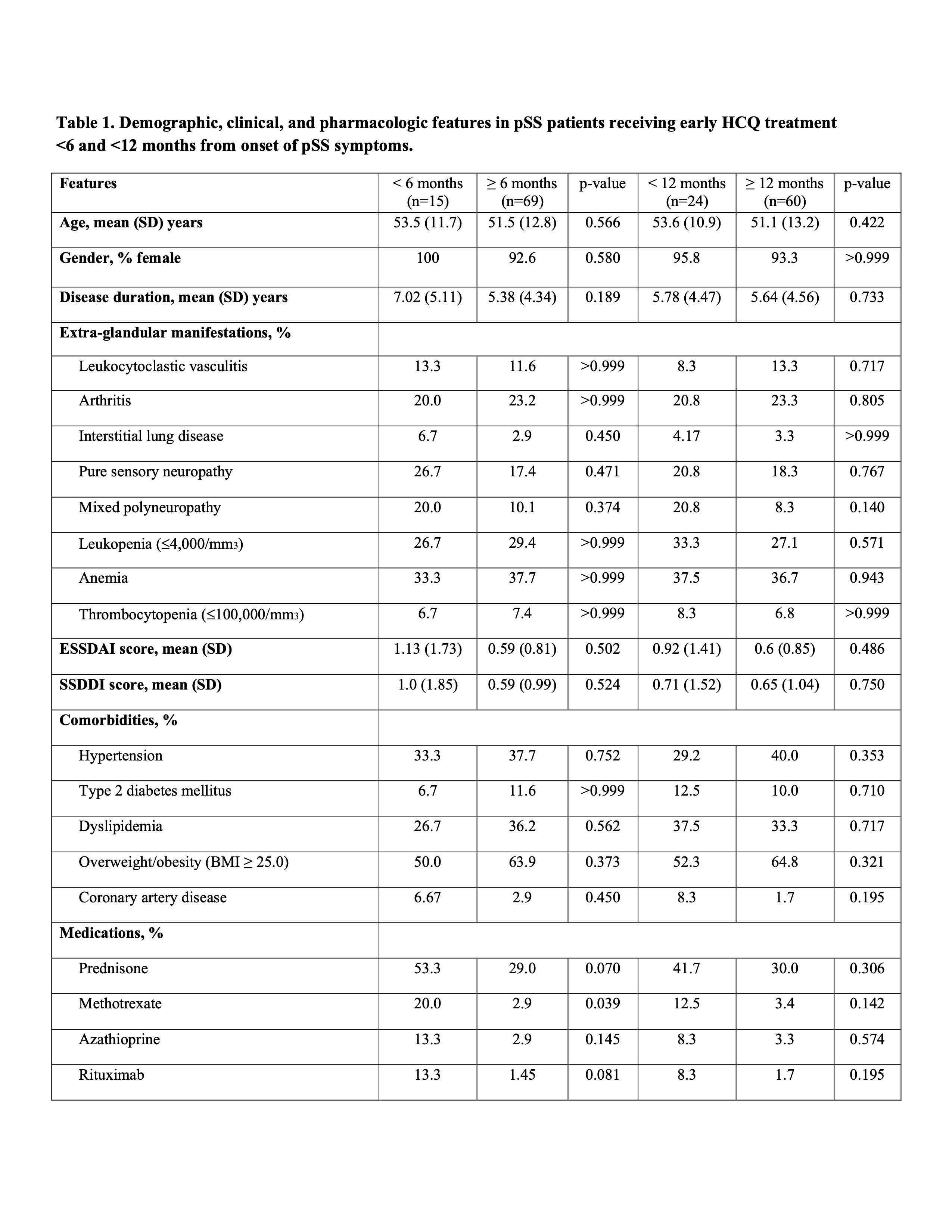Session Information
Date: Sunday, November 8, 2020
Title: Sjögren’s Syndrome Poster
Session Type: Poster Session C
Session Time: 9:00AM-11:00AM
Background/Purpose: Treatment of primary Sjögren’s syndrome (pSS) with hydroxychloroquine (HCQ) has been evaluated in the past but with conflicting results regarding its efficacy. While earlier studies showed its effectiveness on the treatment of sicca symptoms and some extra-glandular manifestations, recent randomized controlled trials have found limited clinical benefit. However, the impact of early treatment with HCQ has not been examined. Thus, we sought to determine the clinical outcome of pSS patients receiving early HCQ therapy.
Methods: A cross-sectional study was performed in a cohort of Hispanics from Puerto Rico with pSS. All patients fulfilled the 2012 American College of Rheumatology classification criteria for pSS. Demographic features, cumulative extra-glandular and comorbidities, disease activity (per EULAR Sjögren’s Syndrome Disease Activity Index [ESSDAI]), disease damage (per Sjögren’s Syndrome Disease Damage Index [SSDDI]), and pharmacologic profile were assessed. Early treatment was defined using the following cutoff periods: initiation of HCQ < 6 and < 12 months from onset of symptoms attributable to pSS, and < 6 and < 12 months from pSS diagnosis. Statistical analyses were performed using Fisher’s exact test, Pearson Chi-squared test, and Wilcoxon rank-sum test, as appropriate.
Results: Of the entire cohort (n=100), 84 were treated with HCQ. Of those who received HCQ, the mean age was 51.9 years and 82.1% were females. Results of the bivariate analysis are depicted in tables 1 and 2. No differences were found for age, gender, extra-glandular manifestations, comorbidities, and disease damage between all study groups. Patients who received HCQ therapy < 6 months from onset of pSS symptoms were more likely to be treated with methotrexate than those who received HCQ ≥6 months after onset of symptoms. Those that had HCQ treatment ≥12 from pSS diagnosis were more likely to have higher mean ESSDAI score when compared to those who received HCQ < 12 months from diagnosis. However, when ESSDAI score was adjusted for disease duration, statistical significance was not retained.
Conclusion: In this group of Hispanics with pSS, no major differences were found for extra-articular manifestations, comorbidities, disease activity, damage accrual, and exposure to immunosuppressive medications. This study suggests that early HCQ has limited effect on the clinical outcome of pSS patients.
To cite this abstract in AMA style:
González-Meléndez A, Jordán-González P, Gago-Piñero R, Varela-Rosario N, Pérez-Ríos N, Vilá L. Lack of Efficacy of Early Treatment with Hydroxychloroquine in a Group of Hispanics with Primary Sjögren’s Syndrome [abstract]. Arthritis Rheumatol. 2020; 72 (suppl 10). https://acrabstracts.org/abstract/lack-of-efficacy-of-early-treatment-with-hydroxychloroquine-in-a-group-of-hispanics-with-primary-sjogrens-syndrome/. Accessed .« Back to ACR Convergence 2020
ACR Meeting Abstracts - https://acrabstracts.org/abstract/lack-of-efficacy-of-early-treatment-with-hydroxychloroquine-in-a-group-of-hispanics-with-primary-sjogrens-syndrome/


